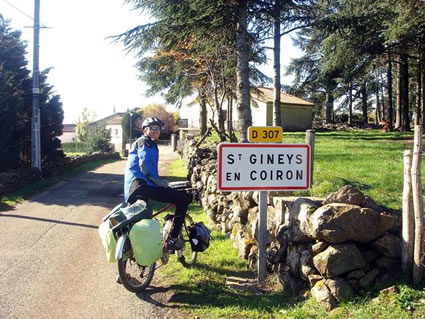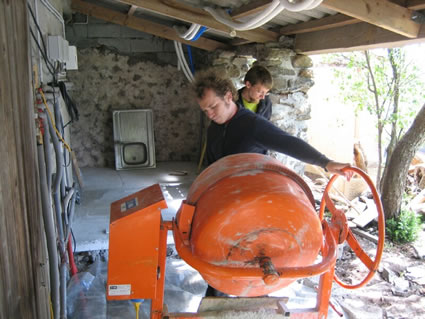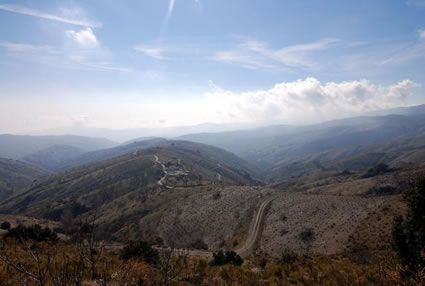Adventures Abroad with the WWOOF Volunteer Program
Story and photos by Friedel Rother

|
|
Arrival at a small French village for our first volunteer experience with WWOOF.
|
“Once in a while you find yourself in an odd situation. You get into it by degrees and in the most natural way but, when you are right in the midst of it, you are suddenly astonished and ask yourself how in the world it all came about.”—Thor Heyerdahl, from the book Kon-Tiki: Across the Pacific in a Raft.
Traveling brings you to the most unexpected places sometimes. A wrong train can drop you in a town that was never meant to be on the itinerary. A chance encounter with a stranger can lead to the family dinner table. With a few years of globetrotting under our belts, our list of things that did not go as planned is long. One of the first began with a plan to experience rural life in Europe.
The Allure of the WWOOF Program
Our flirtation with the idea started when we stumbled on the website for WWOOF or World Wide Opportunities on Organic Farms. This organization matches volunteers with organic farms around the world. We quickly scanned the front page. A few hours of work each day in exchange for food and lodging? Learn about organic farming and sustainable agriculture while conserving our travel budget? That seemed perfect.
Sold on the idea, we handed over a modest membership fee and set about browsing the placements on offer. Chestnut harvesting. Goat cheese making. Vineyard pruning. "Hot springs around the corner," read one ad. The accommodations sounded pretty, too: heritage homes, restored cottages, and sprawling estates set in the most scenic corners of the world.
A few emails later, we booked our place at a farm on a high plateau in France. We arrived on a chilly November day, and even under cloudy skies, the little stone house with its view over a nearby ridge met our expectations of a rural idyll.

|
|
One WWOOF job. Mixing concrete to make a summer barbecue area.
|
The Realities of Volunteer Work with WWOOF
Our bubble burst the following day when we got our first lesson in the realities of WWOOFing: the jobs are not always as you imagine.
"I need you to find a broken sewage pipe. It's down there somewhere," said our host, pointing to a general area of ground where he thought we'd find the reason behind his blocked toilet. "It should only be a couple feet down," he reassured us. Three days later, we were waist-deep in mud, still shoveling and seriously wondering how and why we had arrived here in the first place.
True enough, we had come for organic farming, which certainly involved organic matter—but not the kind we expected to be working with. Our visions consisted mainly of nurturing seedlings and picking vegetables. The buried treasure was finally located on the fourth day. Our muscles ached from moving mounds of earth around. Our hands were stained a dark brown from all the mud.
Other projects followed. Endless buckets of concrete were mixed to make a summer barbecue area. Stones were pulled from fields and gardens and fit together like a jigsaw puzzle to build a wall. An entire garage was cleaned out to make way for a renovation project.
"I'm writing to see how you're doing in the forced labor camp. Um, I mean volunteering on a farm," a friend wrote jokingly one day by email. We felt he had a point. Despite frequent tea breaks, we ended most days with sore muscles. It was hard to explain to those back home how this fit into the "fun" category.
It was hard work. There was no doubt about that, and it did not take long for our romantic notions of farm work to go the way of the dodo. But despite the odds, we did have fun. Good hosts, cheerful companions, and hearty evening meals went a long way to easing the physical pain of the demanding work. And we laughed when we were charged with chasing the farm's flock of chickens out of the trees so they could be put into the co-op for the night. "Out!" we said to the chickens, who refused to obey until they led us on a chase all around the yard.
Chicken chasing was the highlight of our time in France. The rest of our daily routine was far more mundane than the glossy descriptions that first enticed us into WWOOF. Our learning curve focused more on how to avoid blisters than on the finer points of organic farming.
We could have left. That is one of the great advantages of a volunteer program like WWOOF. Having no fixed contract and no financial commitment allows you a trial period of a few days. Stay on longer if the atmosphere suits you, but if not, there is always the first bus out—rural timetables permitting. But we chose not to sneak away. Instead, we stayed to see our projects through to the end. When we left a few weeks later, our enthusiasm for WWOOFing was still intact, helped by pride in a job well done and appreciation from our hosts.
We looked up options in Spain after our first farm stay. One ad called out to us about acres of olive and almond trees in the Alpujarra Mountains, nestled among the more famous peaks of the Sierra range. We were just in time for the olive harvest, and as fans of the finished product, we wanted to see the other end of the process.
The vistas from the Spanish farm certainly did not disappoint. At 1,400 meters above sea level, we had a view down to the Mediterranean, and we were warmly greeted by the family and three dogs. It was a promising start, but the following day brought us back down to earth with another lesson about the erratic nature of farm life.

|
|
View from a WWOOF in Spain.
|
Notions of harvesting olives went out the window with news that uncooperative summer weather meant nothing to pick. Our alternate activities included brush cutting, burning rubbish, and weeding out plants with roots that seemed to be stuck into the ground with super glue.
Once again, this work differed from what we had signed up for. Morale took a further blow when the organic credentials of the farm were cast into doubt. "You're really struggling with those weeds. If it's too hard, let's just throw weedkiller over them," we were told. It was a kind-hearted attempt to keep us from working too hard but did not exactly embody the ideals we assumed were shared by our hosts.
This time, we decided after a few days to make our excuses and leave early. Our hosts were gracious and did not seem to mind that no one would be around to help them refurbish their swimming pool—the next task on the list.
But We Would WWOOF Again
As we headed down the Spanish coast with a ferry ticket to Morocco in our back pockets, we reflected on our WWOOF experiences. Would we do it again? Sure. Amongst all the hard work, we made some good friends and spent time in beautiful settings that we would never have seen otherwise. And we learned some unique skills.
We are just the people to call if you want to build a stone wall or learn how to catch a chicken—two things we knew nothing about before we started. But next time, we will focus less on the vibrant descriptions of the farms and more on packing salves for sore muscles.
Tips For Enjoying Your WWOOF Experience
Do your research. Write out a list of questions about the tasks, the amount of work expected, and the area around the farm. Will you mix concrete or pick the late vegetable garden harvest? How many hours will you be working? Only commit once there is a clear idea on both sides as to precisely what you will be doing. Make a phone call, if necessary, to clarify these issues and to have a good conversation before you book your stay.
Find out if you will be working alone. In our experience, WWOOFing is always best when shared with friends. Hard jobs become much easier if there is someone to share them with.
Keep an open mind about the tasks that come your way. It is all too easy for first-time WWOOFers to assume they will learn far more about organic agriculture than is the case. Often, what is required is little more than manual labor.
Be prepared to entertain yourself. WWOOF hosts are busy, so do not assume they will have time to show you around the area. You are also likely to be in the countryside, so do not expect trendy cafes and tourist attractions on your doorstep.
Only commit for a short time. Start with a few days and extend your stay if you and the host are happy. Better that way than arriving somewhere and feeling you have to stay, even though you are not enjoying yourself.
Be respectful. Remember that you are going into someone's home. A good host will make you feel part of the family. In exchange, you can keep relations smooth by cleaning up after yourself and politely asking before using anything.
For More Information
See the WWOOF organization website country-by-country information.
|
Friedel Rother gave up her job as a journalist for Reuters to ride a bicycle around the world with her husband. After pedalling 48,000km through 30 countries around the globe, she can now be found riding her bike around The Netherlands and working on a book about her 2-wheeled adventure.
|
